The Weapon of "Baptismal Font"
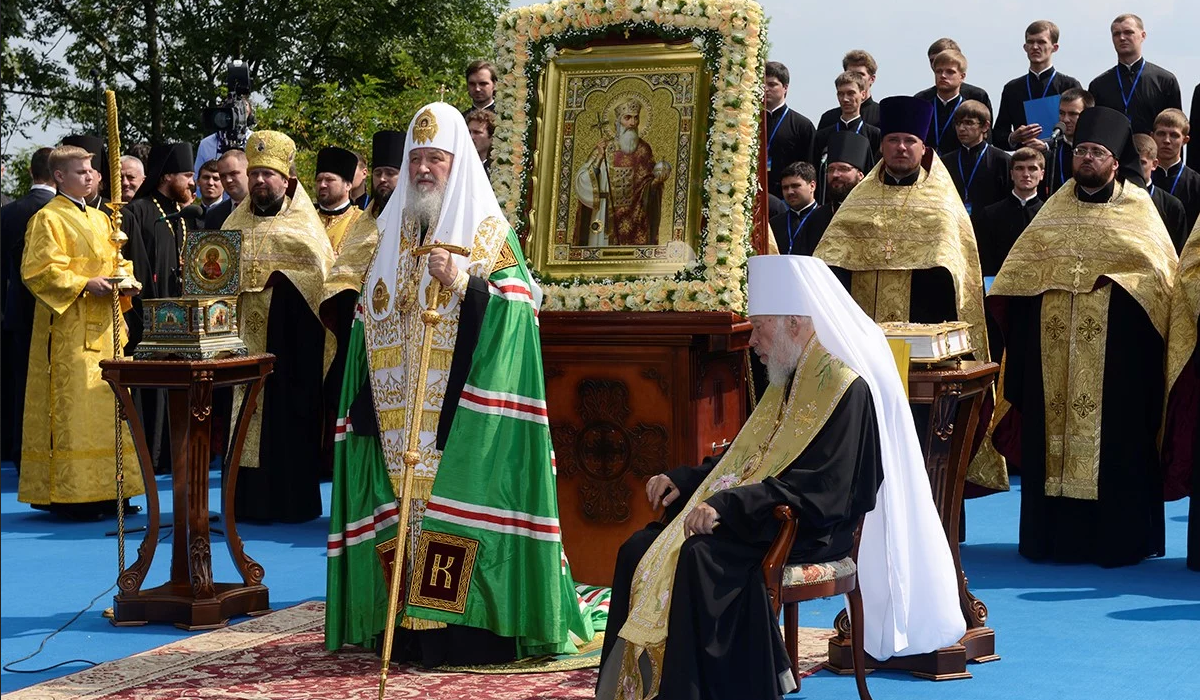
In the photo: Patriarch Kirill and Metropolitan Volodymyr during a festive prayer at St Volodymyr Hill. Kyiv, 2013 (news.church.news)
In 2008, our country established the "Day of the Baptism of Kyivan Rus-Ukraine" as an official state holiday. It is celebrated annually on July 28, which coincides with the day of the repose of Kyivan Prince Volodymyr the Great, also known as the Baptizer of Kyiv. Then, on Independence Day in 2021, President Volodymyr Zelensky approved another holiday for this date, naming it the "Day of Ukrainian Statehood." The selection of July 28 for these significant events raises questions about the motivations behind this decision. To understand the rationale, we need to consider the roles played by various stakeholders, including Russian politicians, Ukrainian lawmakers, media representatives, rock musicians, high-ranking officials of the Kyiv Pechersk Lavra, and "lay politicians" of the Ukrainian Orthodox Church of the Moscow Patriarchate. Examining their involvement will help us grasp the significance of these commemorations.
"Celebration of State Greatness"
The first observance of the "Day of the Baptism of Rus" occurred in 1888, commemorating the 900th anniversary of the event. In the post-Soviet context, the decision-making process was straightforward and familiar. A group of Orthodox associates in Kyiv proposed the idea to Metropolitan of Kyiv and Galicia, Platon, who then developed a project for the celebrations and presented it to the "Holy Synod." The concept was warmly embraced by the St. Petersburg-based "Slavic Charitable Society." This society played a significant role in expanding the commemoration beyond Kyiv, encompassing the entire Russian Empire. Since the Russian Orthodox Church did not have a specific holiday dedicated to the "Baptism of Rus" on its calendar, the date for the celebrations was set to coincide with the day of the repose of Volodymyr the Great, the Baptizer - July 15 (July 28 according to the Julian calendar). The fact that the Kyiv Church celebrated the Baptism Day on August 1 (August 14), in accordance with historical records of Volodymyr baptizing the people of Kyiv, was overlooked. For Moscow, the image of the prince was more associated with state greatness and "political Orthodoxy" rather than Christian spirituality, culture, and education.
Throughout the empire, the celebration did not spread widely. Certain ceremonies were organized only in Moscow and St. Petersburg. In Kyiv, a service was held at St. Sophia Cathedral, followed by a procession to the monument of Kyivan Prince Volodymyr, while in Dnipro, water was consecrated.
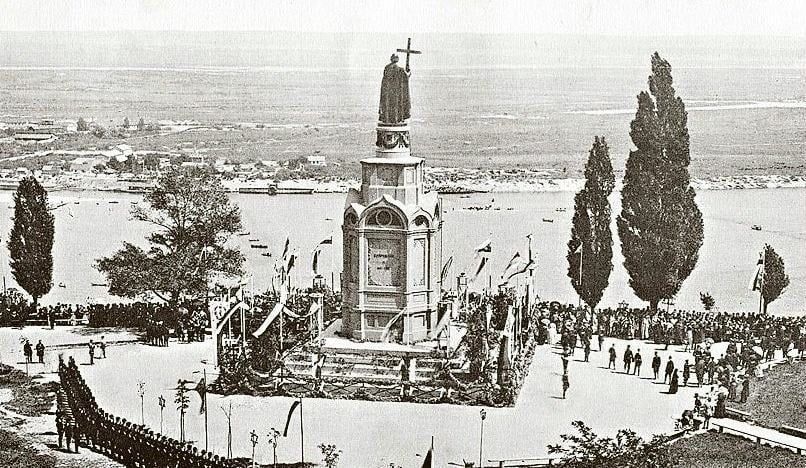
The next anniversary was marked after 100 years, already in the "Soviet empire," shortly before its end. In 1988, contrary to the hopes of Ukrainians and common sense, the main celebration to commemorate the 1000th anniversary of the Baptism of Kyiv was arranged in Moscow. According to the testimony of Valentin Falin, a former Soviet ambassador to the Federal Republic of Germany (FRG), secretary of the Central Committee of the CPSU, and head of the News Agency, it becomes clear that the grand celebrations in 1988 were organized in Moscow with the support of Mikhail Gorbachev. The leader of the USSR was concerned about making the ideas of perestroika understandable to the intelligentsia and gaining the trust of people engaged in intellectual work towards the reformed Soviet authority. Falin proposed that to achieve this, they should celebrate the anniversary of the Baptism as a nationwide event, highlighting it as a "significant stage in the establishment of Rus as a state."
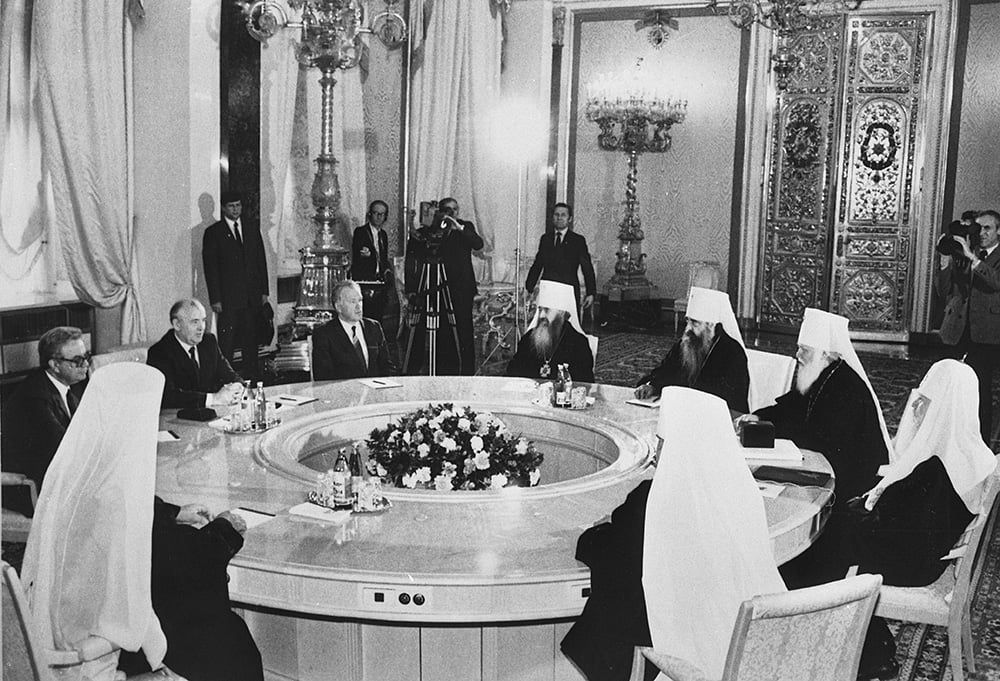
On this occasion, the Far Caves of the Kyiv Pechersk Lavra were transferred to the Russian Church. Consequently, for several decades, on July 28, the festive service in honor of the Baptism took place in the Kyiv Pechersk Lavra with the participation of the hierarchy of the Moscow Patriarchate. Additionally, they presented Metropolitan Volodymyr (Sabodan), who was overseeing the affairs of the Moscow Patriarchy at that time, with a reliquary containing a particle of the relics of the Holy Equal-to-the-Apostles Prince Volodymyr. Subsequently, the reliquary was preserved in Rostov-on-Don, as it was the city where Volodymyr served at that time.
The history of the relics of the Holy Equal-to-the-Apostles Prince Volodymyr is intricate and labyrinthine. He was buried on July 15 (28), 1015, in a marble sarcophagus within the Desyatynna Church in Kyiv, which he had constructed. During the occupation of Kyiv by the forces of Batu Khan, the Desyatynna Church was demolished. It wasn't until 1635 that Metropolitan Petro Mohyla rediscovered the prince's sarcophagus among the ruins. The relics were subsequently kept in the Holy Dormition Cathedral of the Kyiv Pechersk Lavra. Allegedly, a particle of the relics was transferred to the Dormition Cathedral of the Moscow Kremlin.
In 1939, the relics of St. Volodymyr from Kyiv were handed over to the sculptor-anthropologist Mikhail Gerasimov in Leningrad. After the dissolution of the USSR, the reliquary containing the relics was given to the Russian Orthodox Church, and it found its place in the Cathedral of Christ the Savior in Moscow. Presumably, this particle was then granted to Metropolitan Volodymyr.
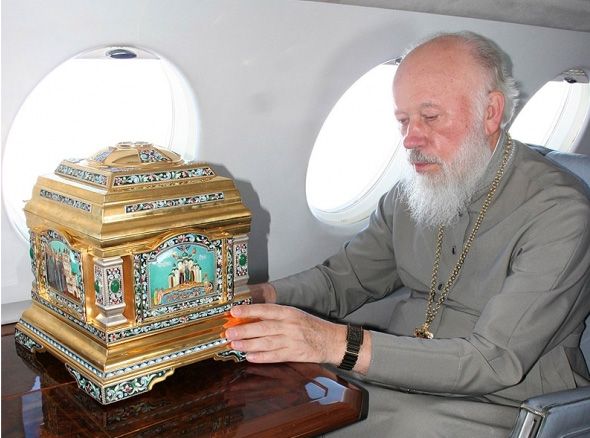
The Secrets of the Holosiiv Hermitage
In 2005, during this occasion, Metropolitan Volodymyr brought the ark containing a particle of the relics of Volodymyr the Great from Rostov to Kyiv. At that time, he was already leading the Ukrainian Orthodox Church of the Moscow Patriarchate (UOC-MP), which was proclaimed in Kharkiv at the pseudo-council in 1992. The transportation of the relics occurred on July 24. On the same day, a 'blue anti-Maidan' gathering emerged in front of the Verkhovna Rada of Ukraine, mainly comprised of elderly women carrying icons and bells. Within a few days, on July 28, the 'anti-Maidan' procession with the ark proceeded through Kyiv.
Around the same time, the head of the UOC-MP approved the marking of the area near the ruins of the Church of the Tithes (Desyatynna) in Kyiv, where, according to legends, Kyiv Prince Volodymyr was buried, with a small building. This illegally installed structure was named the 'male monastery' and the 'Church of the Nativity of the Most Holy Theotokos.' However, in February 2023, a court ruled to dismantle it.
It's worth noting that this was the first year of Viktor Yushchenko's presidency, who was trying to redirect Ukraine's political course 'away from Moscow.' In May of the same year, the 'social technologist' Sergey Gradirovskiy (then the director of the Center for Strategic Research of the Volga Federal District of Russia) and the expert of the 'North-West' Center for Strategic Development, Sergey Pereslegin, published the Russian Vatican project. The co-authors of the project reminded that Russia would no longer be a world empire, and thus, the Russian Orthodox Church would acquire the status of the 'church of a national state' and lose influence in 'canonical territories in Estonia, Moldova, Belarus, and Ukraine.' Therefore, they emphasized the need to 'act immediately.'
On July 19, 2006, a Russian propagandist, the head of the department for Ukraine and Crimea of the Institute of CIS countries, named Kirill Frolov, who led the Association of Orthodox Experts, published a treatise titled “Ukraine as a territory for the Russian people.” Therein, he explained the significance of Crimea for Moscow: “On this land, Saint Volodymyr was baptized, and Russian Orthodoxy began.” In this treatise, the discussion on the "sacred theme" came to a close, and the focus shifted to the "NATO threat." Frolov asserted to journalists that his "association" advocated for the reintegration of peoples from the former USSR and historical Russia. The treatise emphasized the geopolitical challenges and the association's stance on fostering closer ties among these nations.
In November of the same year, the Russian Orthodox Church, together with "near-church circles" of the UOC-MP, established an international (Russian-Ukrainian-Belarusian) public organization called "Day of the Baptism of Rus." It was intended to administer the implementation of the events to celebrate the "1020th anniversary of the Baptism of Kyivan Rus." The celebration was scheduled to take place in two years, in July 2008. The organization was led by a rock musician, the leader of the band "Bratya Karamazovy" (The Brothers Karamazov) - Oleg Kryvoshiya. On the website "Myrotvorets," where Kryvoshiya is listed as a participant in acts of humanitarian and information-psychological aggression against Ukraine, it is mentioned that a member of its board was "regional" (a member of the Party of Regions) Oleksiy Omelyanenko. Kryvoshiya and Omelyanenko were regularly featured on Viktor Medvedchuk's 112 Ukraine TV channel.
In an interview with the newspaper "Fakty" in 2009, Kryvoshiya - also known as "Karamazov" - talked about his acquaintance with Volodymyr (Kirill) Gundyaev in 2003. In his role as Metropolitan of Smolensk and Kaliningrad, Gundyaev invited him for a conversation along with the notorious "deacon" Andriy Kuraiev and the leaders of well-known rock bands "DDT" and "Alisa." Kirill showed interest in rock music as a means of "attracting youth to Orthodoxy." The following year, in 2004, Kirill invited Kryvoshiya and a few others to his Moscow residence - the Danilov Monastery - to discuss the future "baptismal" celebrations in Kyiv.
Kryvoshiya presented a somewhat different picture of the emergence of the idea of "baptismal celebrations" in an interview with "strana.ua" on August 14, 2021.
Supposedly, while walking through the Holosiivskyi Forest on August 14, 2006, he accidentally stumbled upon the Holosiiv Hermitage. There, from Archimandrite Isakiy (Andronik), he unexpectedly learned that on this day, Volodymyr baptized the people of Kyiv. He had an epiphany. Soon after, friends of "Karamazov" began to gather at the monastery, including pro-Russian historian Petro Tolochko, propagandist Yuriy Molchanov, the chief editor of the newspaper "Segodnya" Igor Guzhva, Member of Parliament from the Party of Regions Vasyl Horbal, Member of Parliament from the Medvedchuk-controlled SDPU Party Volodymyr Ryabika, the aforementioned Oleksiy Omelyanenko, the producer of the "Inter" TV channel and the documentary film studio Yegor Benkendorf, the president of the film company "Star Media" Vlad Ryashin, and other media figures and "wallets."
Within a month, they formed the international NGO "Day of the Baptism of Rus" to establish a new tradition - the annual celebration of the Baptism Day "throughout the vastness of Holy Rus." The headquarters of the organization was set up at the Holosiivska Pustyn Monastery, with Archimandrite Isakiy as its "spiritual guardian." In this interview, Kryvoshiya convinces that he subsequently presented the fully developed idea to Metropolitan Kirill of Smolensk and Kaliningrad. However, according to the musician's previous accounts, the topic of celebrating the Baptism of Rus had already been discussed with Gundyaev back in 2004.
Regardless, with Kirill's blessing, the appropriate appeal was sent to the then-Patriarch of Moscow, Alexy II. However, it took another two years to devise a way to present this idea "correctly" to the Ukrainian authorities and the general public.
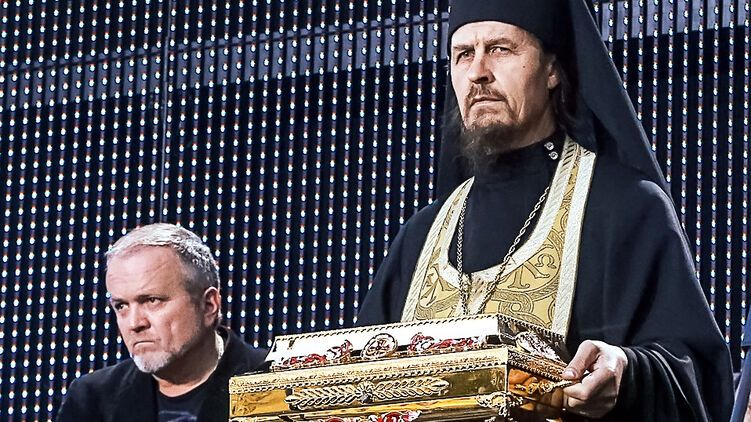
“Cross Processions" Concerts and Relic Journeys
In 2007, the "Day of the Baptism of Rus" was celebrated for the first time in Kyiv. The NGO organized a rock concert at the Spivoche Pole, and it was considered a "rehearsal" for the future international celebration of the 1020th anniversary. The festivities were now aligned with the traditional date of the baptism of Kyiv residents, which was on August 14, rather than July 28. On the evening of August 13, while the youth enjoyed the rock concert, around 300 parishioners from the Moscow Patriarchate (MP) churches participated in a baptismal procession from the Kyiv-Pechersk Lavra to the monument of Volodymyr the Great and to the Dnipro River, where the priests sanctified the water. During a press conference at UNIAN, Vasyl Horbal, a fifth-term MP "regional" and one of the wealthiest residents of Kyiv, announced that the construction of a new church and bathing complex would commence near the Lavra on the Dnipro Embankment. He also revealed that after this event, they would actively develop all the activities for the celebration of the 1020th anniversary, intending it to have an international character.
In the same year, the film company "Star Media" released a multi-series animated film titled "The Legend of the Baptism of Rus." Although this company has Ukrainian registration and even developed a system of premium scholarships for students in collaboration with the Kyiv National University of Theatre, Cinema, and Television, it is listed as a Russian producer. "Star Media" is the largest producer of Russian-language film content and has utilized the territory of Ukraine and its workforce as raw material. The soundtrack for "The Tale of the Baptism of Rus" was done by the "Karamazov Brothers" band. Oleg Kryvoshiya, the band's leader, explained in an interview that they sought historical facts, consulted with academics, and referred to primary sources while working on the film. He asserted that Ukraine is an invented state and was created by the Communists. According to him, Kyiv Rus encompassed all Slavs, and there was no division between Belarusians, Russians, and Ukrainians.
The following year, in 2008, with the support of the Russian Orthodox Church (ROC), Kryvoshiya organized a rock tour across 26 cities in Ukraine to mark the 1020th anniversary of the Baptism of Rus. The tour featured performances by the "DDT" and "S.K.A.I." bands, as well as church choirs and "deacon" Andriy Kuraev. Along the entire route, conferences, screenings of the film "The Tale of the Baptism of Rus," and rock concerts were held. The participants were rock musicians from Ukraine, Russia, Belarus, and Serbia, representing the four Orthodox Slavic nations.
In 2008, "The Day of the Baptism of Rus" was officially celebrated in Ukraine at the state level for the first time. However, the exact time when the government made this decision remains somewhat mysterious. Some sources suggest that the Archierey Council of the Russian Orthodox Church (ROC) decided in June 2008 to propose to the leaders of Russia, Ukraine, and Belarus to include this day among the state memorial dates. Allegedly, the Ukrainian authorities were the first to respond positively. Sources from the Ukrainian Orthodox Church (Moscow Patriarchate) report that the initiative came from Metropolitan Volodymyr (Sabodan). On behalf of the Holy Synod of the Ukrainian Orthodox Church (MP), he addressed the first officials of the Ukrainian state on July 16, requesting to grant the status of a state holiday, "The Day of the Baptism of Kyivan Rus," to the memorial day of the Equal-to-the-Apostles Prince Volodymyr, celebrated on July 28. Official Ukrainian sources, on the other hand, attest that on February 12, 2008, during the official visit of President Viktor Yushchenko to the Russian Federation, Vladimir Putin proposed to him to celebrate the 1020th anniversary of the Baptism together.
Regardless, under the auspices of the NGO "The Day of the Baptism of Rus," a program of celebrations was presented in Kyiv on February 15, 2008, at the "Interfax-Ukraine" press center. The organizing committee included prominent figures "close to Ukrainian Orthodoxy": Dmytro Tabachnyk, Petro Poroshenko, MPs Yuriy Karmazin and Vasil Horbal, and propagandist Yuriy Molchanov. Also, Bishop Oleksandr (Drabynko), the Vicar of the Kyiv Metropolis of the Moscow Patriarchate, was involved. According to MP "regional" MP Vasil Horbal, the celebrations were planned to be financed by patrons. However, the organizing committee prepared letters to the Verkhovna Rada and the President of Ukraine, requesting their support for the festivities at the state level. This suggests official consent to the plan of events from the Moscow Patriarchate.
On February 21, Victor Yushchenko invited the Moscow Patriarch Alexy II to the celebrations in Kyiv. According to the plan, the series of festivities opened with a March roundtable discussion titled "The Day of the Baptism of Rus: the First Holiday of the Homeland" at the Kyiv-Pechersk Lavra. Then, on April 27, the aforementioned "enlightenment tour" started in Kyiv, covering 26 cities and eventually moving to the territories of Russia and Belarus by the end of August. However, the plan of celebrations was overshadowed by Soviet-era events. For instance, in Krivyi Rih, "Orthodox activists" planted an alley of trees near the MP's Transfiguration Cathedral in honor of the 1020th anniversary of the Baptism of Rus. Additionally, throughout the "anniversary" year, special rapid technology was intended to be used to build churches dedicated to the Baptism of Rus in all Ukrainian dioceses. The first buildings were planned to be laid in March in the Odessa and Siverskodonetsk dioceses, but the people of Zhytomyr outpaced them in this "social competition." On February 18, they already laid the foundation for such a church and hoped to complete it by the feast of Pokrova (Protection of the Theotokos).
Not quite a Moscow-script
Shortly before the date, on July 25, 2008, Victor Yushchenko signed a decree (No. 668/2008) "On the Day of the Baptism of Kyivan Rus – Ukraine," which declared July 28 a state holiday. However, the celebrations did not follow the Moscow script. During the liturgy, Patriarch Bartholomew, Patriarch Alexy II, and Metropolitan Volodymyr of the Ukrainian Orthodox Church (Moscow Patriarchate) co-celebrated, along with representatives of Orthodox churches from around the world. Such a high level of spiritual representation in Kyiv had not been seen for centuries. The service was conducted in Greek and Church Slavonic (in Russian transcription). Prayers were offered for Ukraine and its people. During the commemoration of bishops, they first mentioned Ecumenical Patriarch Bartholomew, then Alexy II, followed by the Archbishop of Athens, Metropolitan Volodymyr, and others. Patriarch Bartholomew delivered the liturgy of Communion in Greek. Finally, Alexy II publicly commemorated Patriarch Bartholomew of Constantinople, the Ecumenical Patriarch. This might have been challenging for Alexy II since he considered Moscow the center of world Orthodoxy and referred to Patriarch Bartholomew as the Patriarch of Istanbul, or, at best, the Byzantine Patriarch, in Russian media.
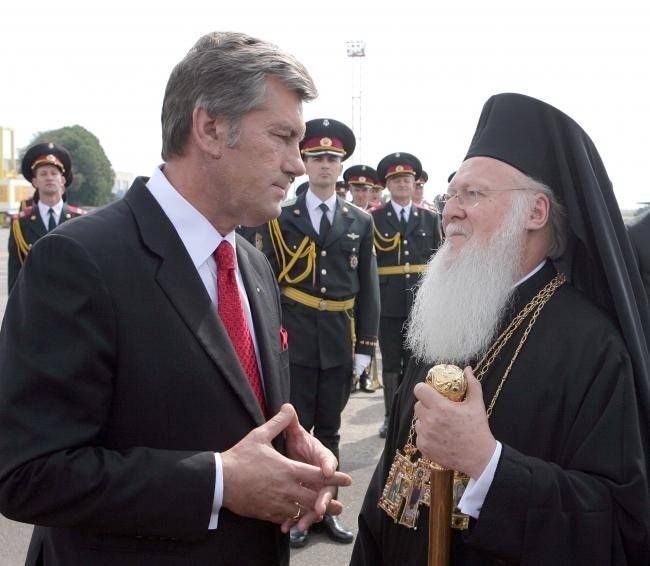
By the way, on the eve of the celebrations, Patriarch of Moscow, Alexy II, sent a letter to then President of the Russian Federation, Dmitry Medvedev, on behalf of the Hierarchical Council of the Russian Orthodox Church (ROC), suggesting that, due to the significance of the Baptism for the peoples of Russia, Ukraine, and Belarus, the commemoration of Prince Vladimir should be observed as a state holiday in Russia. This move was seen as a step towards aligning Ukraine with the 'Russian world,' gradually bringing the two countries closer together.
On April 29, 2009, Prime Minister Yulia Tymoshenko, while visiting the official patriarchal residence at the Danilov Monastery, invited the newly-elected Patriarch of the ROC, Kirill, to visit Ukraine. He reminded the Prime Minister that the religious factor in Ukraine's relations with Russia should be strengthened. From the early months of his leadership, the bishop stated that he intended to "help Ukraine... change the atmosphere of relations between Ukraine and Russia." For instance, in an interview with the newspaper "Izvestiya," he mentioned that "today, more than ever, the Orthodox of Russia, Ukraine, and Belarus realize the importance of the spiritual unity of historical Rus, divided by political borders."
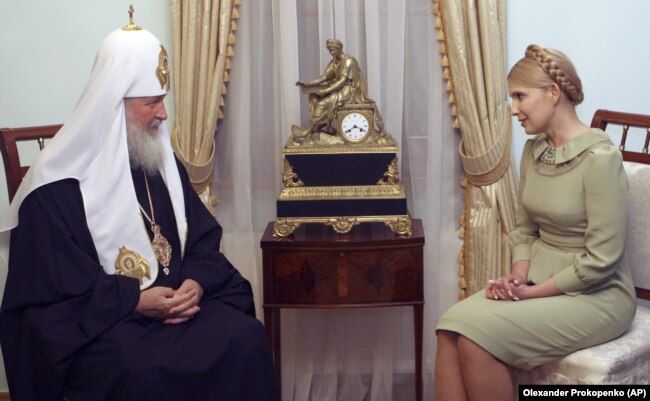
On July 28, Kirill arrived in Kyiv. "The Patriarch is coming to testify: the Ukrainian Orthodox Church is an integral part of the Russian Orthodox Church, its canonical territory," said Metropolitan Agafangel of Odesa and Izmail.
Together with Metropolitan Volodymyr of Kyiv and the leaders of the Belarusian and Moldovan Orthodox Churches of the Moscow Patriarchate, the head of the Russian Orthodox Church conducted a prayer service near the monument of the Baptizer of Kyiv. By ten o'clock, several thousand people had gathered there, noticeably fewer than a year ago when the festive service on the occasion of the 1020th anniversary of the Baptism was led by the Ecumenical Patriarch Bartholomew. The gathering joyfully greeted the bishop with shouts of "Our Patriarch is Kirill!" accompanied by enthusiastic applause. As the excitement grew, the crowd started chanting, "Our Metropolitan is Volodymyr!" Victor Yanukovych was standing near Metropolitan Volodymyr by the monument. Notable figures from the Ukrainian political sphere, such as Anna Herman, Inna Bohoslovska, and Raïsa Bohatyriova, were also observed among the attendees.
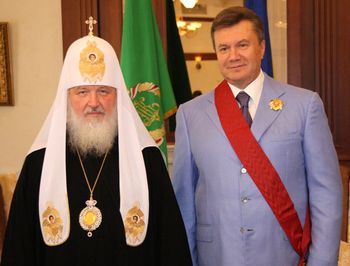
In his welcoming speech after the service, Patriarch Kirill emphasized that the Russian Orthodox Church (ROC) is not only the Church of the Russian people but also of various nations. He stated that the Church should remain a common space. The Moscow Patriarch reassured that he would pray for the friendship of the brotherly nations who emerged from the waters of the Dnieper and their "indivisible spiritual and ecclesiastical unity."
Following the service, the Synod of the Russian Orthodox Church gathered at the Kyiv-Pechersk Lavra, marking the first time in history that the "hierarchs of the unified Russian Orthodox Church" assembled in the ancient southern capital of Russian Orthodoxy. Notably, preceding the visit of the Moscow Patriarch to Kyiv, there was a "motorcycle race" by the biker clubs "Moscow-Sevastopol" and a "swimming event" by a Crimean athlete in the Black Sea, both in his honor.
Meanwhile, President Viktor Yushchenko, while congratulating Ukrainians on the Day of the Baptism of Ukraine-Rus, once again emphasized the need for recognition of its local Orthodox Church.
"Sacred Customs Union"
On August 14, 2009, during the commemoration of the baptism of Kyivan residents in Kyiv, then-President of Russia, Dmitry Medvedev, issued instructions to his officials to draft a law establishing an official state holiday in Russia known as the Day of the Baptism of Rus. The proposed holiday aimed to celebrate the historical event that had a profound influence on the social, spiritual, and cultural development of the Russian people, as well as the consolidation of Russian statehood. After due consideration, the law was officially approved on May 31, 2010, solidifying the significance of the Baptism of Rus in Russia's national calendar. Nevertheless, the Moscow Patriarch once again flew to Kyiv for the celebration of the Baptism of Rus. In anticipation of his visit, a Ukrainian version of the official ROC website was presented in Moscow, where the main documents and news of the ROC were planned to be provided in the Ukrainian language. It was announced that the Moscow Patriarch was preparing to acquire Ukrainian citizenship and... lead the Ukrainian Orthodox Church. At that time, Kirill hoped for the Pan-Orthodox Council, during which the Moscow Patriarchate would gain the status of a "supranational church," rising above the Georgian, Bulgarian, and perhaps even the Greek Orthodox Churches, while also advocating the idea of the "Russian world."
The Kyiv-Pechersk Lavra was intended to be the stronghold of Moscow Orthodoxy and a confirmation of its importance in the world. The idea of establishing an "Orthodox Vatican" in the Lavra as an independent state led by the Patriarch was approved by "radical believers," such as Denis Shevchuk, the leader of the "Rus" party.
Although not officially announced, the far-sighted plans of creative church officials were evidenced by the change in ownership of the Kyiv-Pechersk Historical and Cultural Preserve. The Kyiv City Council transferred it from municipal ownership to state ownership.
On July 27, Patriarch Kirill opened the session of the Synod of the Russian Orthodox Church at the St. Sophia Cathedral in Kyiv. One of the main issues discussed was the "schism of Ukrainian Orthodoxy." He stated that this was the first time in history that the Synod of the ROC convened in the first cathedral of Kyivan Rus, from where numerous missionaries were sent to spread Christianity throughout the Kyivan state, "Christianizing this vast territory that we now call the spiritual space of Holy Rus." Prior to the Synod, the religious organization had approached then-President Viktor Yanukovych, demanding the transfer of the St. Sophia Cathedral to the ROC.
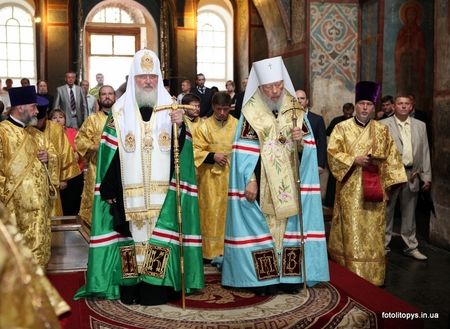
The preparation for the 1025th anniversary of the Baptism of Rus in 2013 brought together the Ukrainian Orthodox Church of the Moscow Patriarchate and the government of Ukraine in joint efforts. The relevant organizing committee was formed by the Cabinet of Ministers of Ukraine. The celebration also saw an "international unity," as in 2011 and 2012, the NGO "Day of Baptism of Rus" organized simultaneous festivities in the capitals of "the three fraternal nations": Kyiv, Moscow, and Minsk. It is worth noting that the leader of this NGO, Oleg Krivoshya, who is also the leader of the band "Braty Karamazovy," was awarded the Order of Friendship by Vladimir Putin in November 2012 during a reception dedicated to the "Day of National Unity."
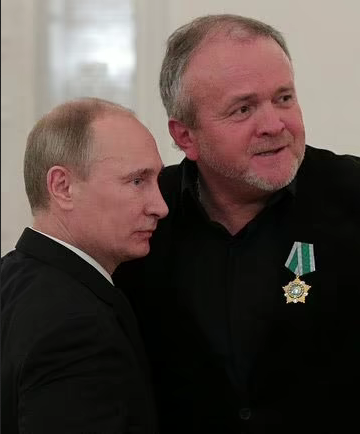
The celebrations were broadcasted on Ukraine's First Channel. Before that, in May of the same year, Metropolitan Volodymyr (Sabodan) of the Ukrainian Orthodox Church of the Moscow Patriarchate presented Kryvoshiya with the Order of St. Andrew the First-Called for his service to the Orthodox Church.
In 2013, the celebrations of the baptism of Kyivans began in Moscow, not in Kyiv, for the first time. Despite the Ukrainian government's prior declaration of their own scenario for the festivities, President Viktor Yanukovych signed a decree on January 21, 2013, regarding the organization of the celebration of the 1025th anniversary of the Baptism of Kyivan Rus in Ukraine. A few days later, during a meeting between the President and the heads of Ukrainian Churches, a Ukrainian organizing committee was formed, consisting of representatives from all Orthodox Churches, as well as the Ukrainian Greek Catholic and Roman Catholic Churches. In mid-April, the central government of Ukraine seemed unaware of the Moscow scenario. The plan was to hold joint celebrations at the Kyiv Palace "Ukraine" on July 26, with the participation of all the heads of Ukrainian Churches and the President, followed by an official reception and a concert.
Victor Yanukovych, during a meeting with the Church leaders, stated that it would be a celebration of "the triumph of Ukrainian statehood and its European identity." It was expected that Patriarch Kirill would also arrive in Kyiv, as usual.
However, from February 2 to 5, the Russian Orthodox Church (ROC) held an Episcopal Council in Moscow. They decided to establish a church and community organizing committee to celebrate the "anniversary date," under the chairmanship of Patriarch Kirill of Moscow and All Russia. Interestingly, Oleg Krivoshya-Karamazov mentioned that they began developing and submitting the plan of events for the 1025th anniversary celebration for the blessing of the Moscow Patriarchate as early as the summer of 2012.
On March 12, 2013, according to the records in the journal of the ROC Synod, Metropolitan Volodymyr of Kyiv sent a request to Kirill to lead the committee for the anniversary celebration. The next day, after the first meeting of the Moscow organizing committee, the head of the Kyiv State Administration, Oleksandr Popov, instructed his subordinates to "speed up the process" of preparations for the anniversary. From March 27, representatives of the higher and city authorities, ministers, and metropolitans from Ukraine started traveling to Moscow for "planning."
In an Easter interview with the "Inter" channel, the leader of the ROC did not hide that the scope of the celebrations would "make people think about common roots" and "influence the mentality of our contemporaries." This myth of being a "spiritual leader" echoed the speeches of pro-Russian politicians about the necessity of the Customs Union...
On May 4, Oleg Slepynin, a writer from Cherkasy and a member of the Writers' Union of Russia, and laureate of the "Russian World" prize, expressed his indignation in the article titled "Threats to the Celebration of the 1025th Anniversary of the Baptism of Rus" in the online newspaper "Odna Rodina." He was upset that President Yanukovych, "following the Orange-imposed fashion," spoke about the celebration of the 1025th anniversary as a triumph of Ukraine's European identity.
Slepynin was also angered by the position of the Ukrainian Orthodox Church of the Moscow Patriarchate (UOC-MP). He pointed out the difference in language used on the official websites of the Moscow Patriarchate and the Ukrainian Orthodox Church. The Moscow Patriarchate's website referred to the celebration of the "1025th Baptism of Rus," while the Ukrainian Orthodox Church's website referred to the celebration of the "Baptism of Kyivan Rus." He saw this as a manipulation of words that distorts the truth, attaching the epithet "Kyivan" to the word "Rus" in a foreign document.
As part of the implementation of the Moscow scenario, the NGO "Day of the Baptism of Rus" organized an "international baptismal procession" with the relics of Prince Volodymyr. The procession began in Vladivostok and lasted, according to various sources, from two months to half a year. By early July, it reached Ukraine, moving through all the eparchies of the UOC-MP from Sevastopol to Kyiv. Patriarch Kirill did an unprecedented thing - he ordered the relics of the saint to be transported from city to city, treating them as a magical object for the "unity of the Russian world."
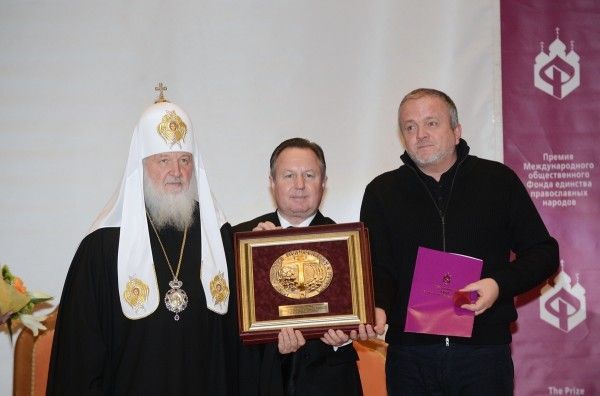
Together with the "baptismal procession," artists also participated. On July 27, a final concert of "Orthodox rock musicians" took place on Khreshchatyk to celebrate the 1025th anniversary of the baptism. The concert featured bands such as "Braty Karamazovy," "Alisa," "S.K.A.Y.," "Yu-Piter," and the Kuban Cossack Choir. According to Russian media, the concert was broadcast worldwide. On the same day, President Viktor Yanukovych awarded Patriarch Kirill of Moscow with the Order of Prince Yaroslav the Wise.
Russian President Vladimir Putin attended the celebration of the 1025th anniversary of the baptism as well. Addressing Viktor Yanukovych, he conveyed a message to everyone, emphasizing the spirit of unity and common roots, and highlighting the achievements made in the past century. Putin expressed determination to move forward, drawing on the accomplishments of their ancestors. He also attended the conference "Orthodox-Slavic Values as the Basis for Ukraine's Civilizational Choice," organized by Viktor Medvedchuk. It was noted that this formulation indicated a choice - whether to move closer to the European Union or join the Customs Union. Viktor Medvedchuk presented his own vision of the benefits of the Customs Union for Ukraine.
"Statehood Day": Who Is First?
When the government changed as a result of the Maidan, and Russia started a war against Ukraine, the UOC MP continued to celebrate July 28 with its own meaning. So, in 2016, on the eve of this date, the Fathers organized the "All-Ukrainian March of Peace, Prayer and Love" - from Sviatohirskaya Lavra in the east and Pochaivskaya Lavra in the west - to Kyiv. At the same time, people with St. George's ribbons and a portrait of Tsar Nicholas II were seen in the columns.
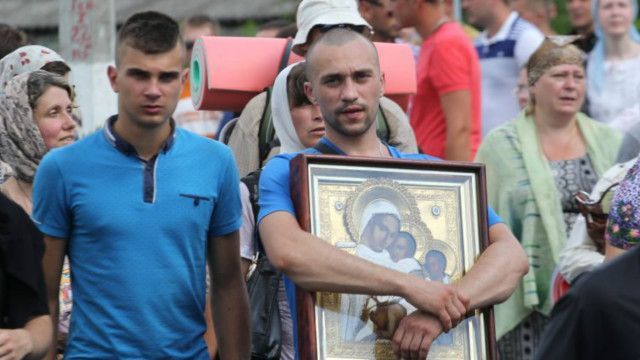
In 2017, a similar event accompanied the procession of 11 miraculous icons and relics of the Equal-to-the-Apostles Prince Volodymyr, which later "traveled to various dioceses of Ukraine." According to sources from the Ukrainian Orthodox Church of the Moscow Patriarchate (UOC MP), the event gathered a record 100,000 participants, including Orthodox believers from all dioceses of Ukraine, groups of pilgrims from Belarus, Russia, Moldova, Greece, Romania, and other countries worldwide.
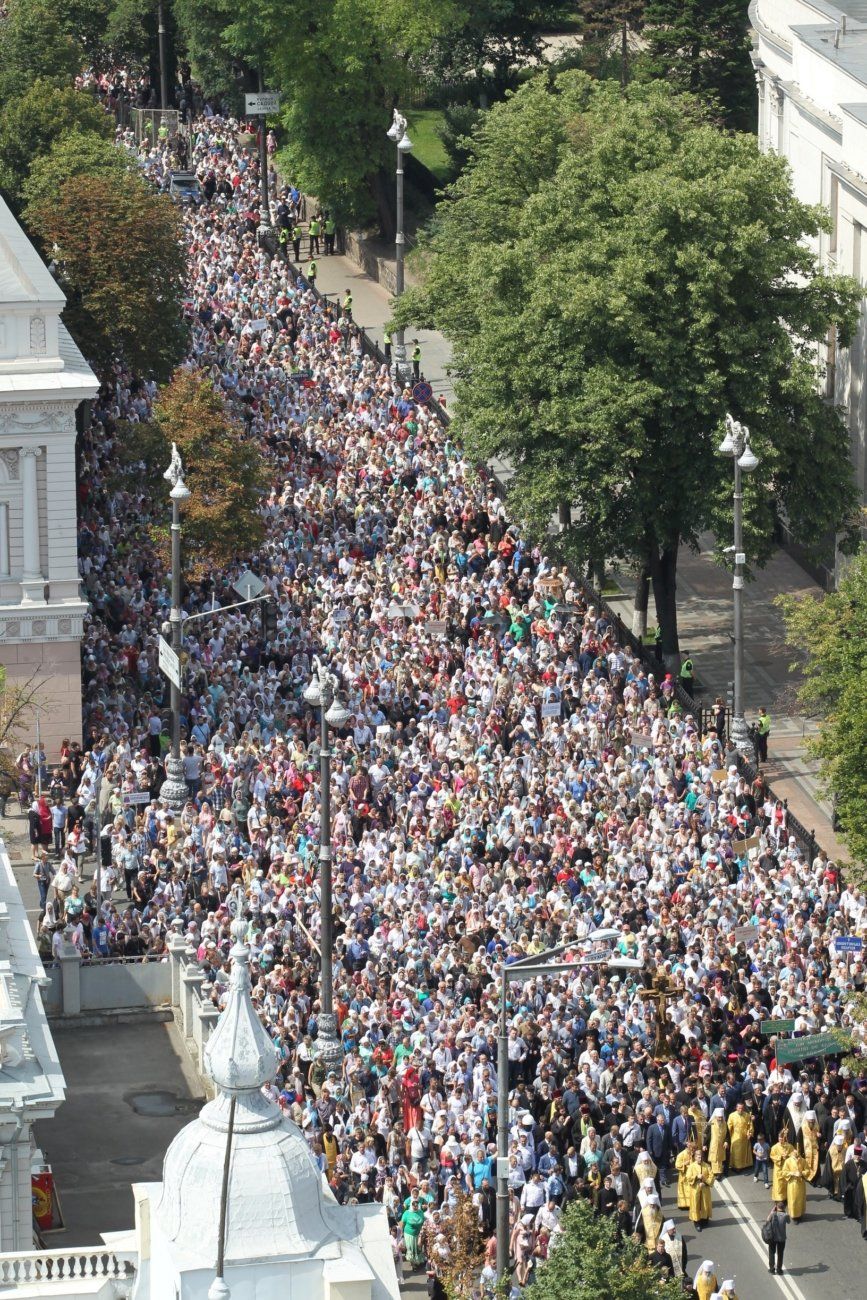
In 2019, the Ukrainian Orthodox Church of the Moscow Patriarchate (UOC MP) organized a cross procession on July 27, carrying not only an imperishable particle of Saint Volodymyr but also the foot of Saint Andrew the First-Called and particles of relics from 18 other saints from the Pechersk Lavra, Pochayiv Lavra, and Sviatohirsk Lavra. During the same year, Patriarch Kirill stated that the "spiritual, cultural, and civilizational unity of Russians and Ukrainians is stronger than temporary political schemes and models that work to undermine this unity." At that time, Volodymyr Zelensky was the President of Ukraine. Kirill congratulated him on his position and expressed hope that Zelensky would be able to unite the nation, overcome conflicts and divisions, and put an end to the "grieving period of persecution and discrimination against citizens of Ukraine who belong to the Ukrainian Orthodox Church." Prior to this, the Verkhovna Rada of Ukraine had passed a law that required the UOC MP to change its name to the Russian Orthodox Church in Ukraine within a three-month period, but the name change did not officially happen after the change of power.
During the same year, the active Oleg Kryvoshiya, along with his mentioned friends, initiated the international public project "People" – a media platform aimed at uniting "many people from different countries on the planet." In 2020, the Synod of the Russian Orthodox Church (ROC) initiated the international forum "People of Peace" associated with this project, which started on September 28 at the Sviatohirsk Lavra. Its purpose was to "establish a dialogue between citizens of Ukraine living on both sides of the conflict line in Donbas." Kryvoshiya argued that only the UOC MP could stop the bloodshed and establish peace, and people from different countries around the world should unite around this cause – "people of peace."
The following year, in 2021, President Volodymyr Zelensky declared July 28 as the "Day of Ukrainian Statehood" (which was later approved by the Verkhovna Rada in May 2022). Zelensky justified this decision by considering the founding of Kyiv as the starting point of Ukrainian statehood, so the new holiday would be celebrated on the day of the Baptism of Kyivan Rus. One might question the logic behind this reasoning, as the establishment of Kyivan Rus was indeed a significant event in Ukrainian history but not necessarily the direct founding of the modern Ukrainian state.
It's essential to note that these historical events and statements are based on the information provided and should be verified using reliable sources to obtain a comprehensive and accurate understanding of the context and significance of each event.
In historical sources, the mention of the Kyiv state dates back to 860 when Prince Askold made the first campaign to Tsargrad (Constantinople). According to archaeological data, Kyiv's history goes back much further, more than 1500 years. However, the significance of the year 988 lies in the context of the Russian statehood, according to the version of the Russian authorities, which traces its roots back to 862 with the legendary event known as the "calling of the Varangians" to Novgorod.
What type of state was the Novgorod Republic? It was a state in northeastern Europe that thrived from 1136 to 1478. In 1136, Novgorod gained political independence from Kyiv, but in 1478, it suffered a brutal annexation by Muscovy. The culture of Novgorod was deeply rooted in Kyivan Rus. While the year 859 is regarded as the first mention of Novgorod in historical chronicles, archaeological findings suggest that the area primarily consisted of small military settlements of Varangians at that time.
According to the "Primary Chronicle," in 862, the people of Novgorod invited the Varangian Rurik to rule over them. However, it is known that this historical account has been edited on the orders of different rulers throughout the ancient history of Rus. Ukrainian philosopher and publicist Petro Kraliuk argues that the idea of the origin of statehood from the "calling of the Varangians" was developed in the Russian Empire at a time when its rulers were of Germanic origin.
For some reason, it was decided that attributing the foundation of the Russian state to Germans would boost the fighting spirit of the Slavs. The first celebration of this holiday took place in 1862 during the reign of Emperor Alexander II when they unveiled the monument "Millennium of Russia" in the Novgorod Kremlin. Celebrations were revived in the Russian Federation in 2011 to "consolidate society, foster patriotic feelings, and promote development." In 2012, they grandly celebrated the "1150th anniversary of Russian statehood." Since then, the "Day of Russian Statehood" has been annually observed on September 21 in the Russian Federation as both a holiday commemorating the origin of Russian statehood and a day of military glory for Russia. This may be done to eventually "prove" that Kyiv is not the "Mother of Russian Cities" but rather a daughter or even a granddaughter of Moscow's realm.
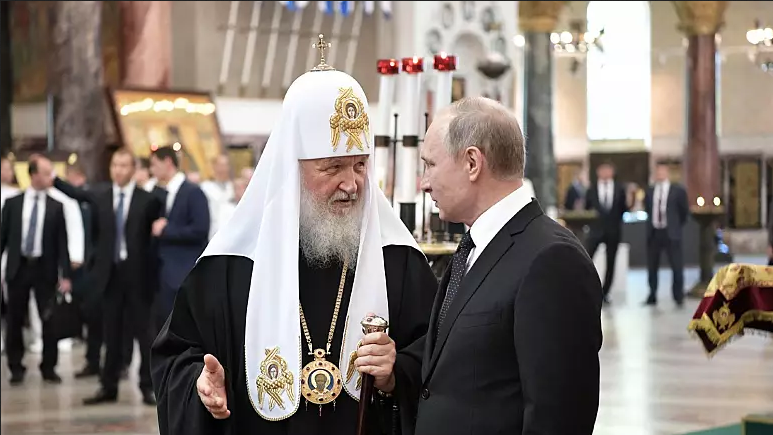
"Here, the Day of Baptism intertwines cunningly with the days of 'statehood,' customs union, processions with bells under Party of Regions flags, rock concerts, and 'Ukrainian Choice' by Medvedchuk, the Ukrainian Orthodox Church of the Moscow Patriarchate, and Ukrainian authorities. Why does Ukraine need all of this? Perhaps it's worth returning to a genuinely Ukrainian celebration on August 1 (14), when Kyiv's people, without political speeches and manipulation of religious relics, would walk to the Dnipro – their 'Jordan' – in a grand cross procession to recall the spiritual gifts and virtues acquired by the Ukrainian-Rus' community with the acceptance of Christianity."
##DONATE_TEXT_BLOCK##





